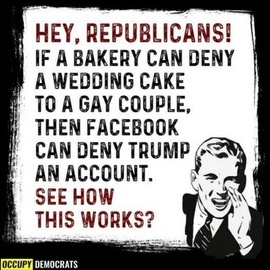Be part of the movement!
Welcome to the community for those who value free speech, evidence and civil discourse.Create your free account
3 comments
Feel free to reply to any comment by clicking the "Reply" button.You raise a valid point. Regardless of whether or not I personally agree on a matter, private entities reserve the right to run their business as they see fit. If I disagree, then I am free to move on to another source or business.
@TheMiddleWay Good way of looking at it.
You have challenged me to think of both sides of the issue, and that is always helpful. "Iron sharpens iron, and one man sharpens another" (Prov. 27:17 ESV).
Apples and oranges.
@TheMiddleWay Jack Phillips' Masterpiece Cakeshop is not a major internet platform that has a great deal of power and control of internet content and speech with a special exemption under 47 U.S.C. § 230, a Provision of the Communication Decency Act. I think you might have a good point if Facebook did not have this particular legal exemption, which they should lose, as Alan Dershowitz has argued:
Jack Phillips' case was also based upon a freedom of religion argument as well, as I understand it.
@TheMiddleWay First, scope does matter when making such a comparison, since Jack Phillips' refusal to decorate a cake for a gay wedding on religious grounds does not really put a hardship on the gay couple in question. There are lots of bakeries that could do that. He does not have a virtual monopoly on cake decorating. Facebook, Google, and Twitter, however, have a huge amount of control of information, and the way they manipulate that control can arguably cause a great deal of harm. Such factors are always taken into account when civil lawsuits go forward. Such issues are also taken into account when deciding whether or not such companies function as a platform that is more like a utility (such as phone companies). As I see it, there is room for debate about that, but Section 230 basically allows them to be treated like a platform, although they have been acting more like a publisher with editorial control.
Second, you are correct in asserting that Section 230 does not require that they allow all kinds of speech. For example, as I understand the code, they cannot allow obviously illegal speech. But they have gone far beyond what Section 230 requires in this regard and have chosen to censor speech and information with which they simply disagree, citing obviously bogus reasons.
At any rate, I seriously doubt that you and I are going to agree on this point. The whole issue needs to be adjudicated in the courts, but, as I see it, Section 230 protections need to be removed, and then these companies can do whatever they like and suffer the potential consequences that any other publisher of third party information would have to suffer.
@TheMiddleWay I can see that I was very imprecise in what said there. When I was referring to the removal of Section 230 protections, I was referring to the companies mentioned, whose combined dominance and control of massive platforms and information can enable them to essentially silence views with which they disagree, keeping it from a large majority of people, certainly perhaps at least half of the population. The debate right now, it seems, is that such control makes them more analogous to a utility in some respects and that, therefore, they should be treated as such. In fact, Section 230 seems to treat them almost as utilities which provide a platform for dissemination of information, with immunity for those providing the platform. But that also requires those providing the platform not to interfere unnecessarily with the information being disseminated. Such unnecessary and biased interference is what companies like Google, Facebook, and Twitter appear to have been doing. In my opinion, we should not end Section 230 itself, but rather amend it, as a Heritage Foundation writer has recommended here: [heritage.org]
After all, the original reason for those actions is that social media considered DJT and COVID misinformation harmful. And given that half the nation would likely agree with both sentiments, it would be hard to convince the courts that it's NOT harmful, you know?
Well, the courts would likely have to weigh the fact that such large disagreement also undermines the point of view that says that such information is, indeed, harmful. And the courts would also have to weigh how much influence these platforms have already had in convincing so many people that such information is, indeed, harmful, given that they have done their level best to prevent them from hearing any contrary information about it in the first place.
I'll be interested to see how it all comes out. As for me, I left Twitter a long time ago because it was so filled with pornography. In fact, I have it blocked via my Cleanbrowsing App. I also left Facebook due to what I saw as their unreasonable censorship of a number of things I and others had posted. As a result, I took a pretty large hit to the traffic generated from both of these platforms for my blog. I have also not been able to be in contact as easily with a number of friends and family. But, it was a choice I made as a matter of principle, and I am content to live with the consequences.
Be part of the movement!
Welcome to the community for those who value free speech, evidence and civil discourse.Create your free account
Share this post
Categories
Slug does not evaluate or guarantee the accuracy of any content. Read full disclaimer.







